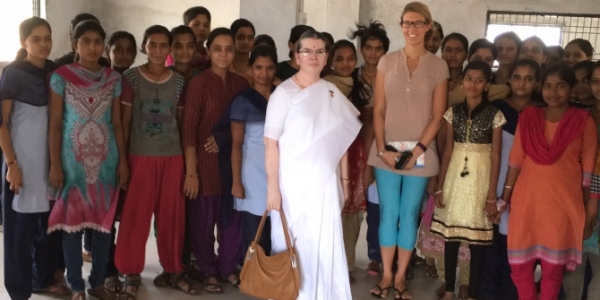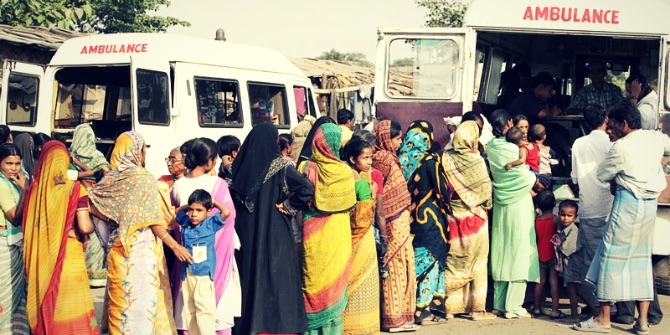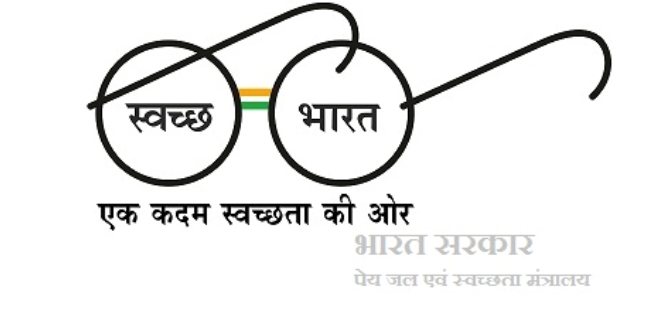 Elisabeth Prager recently volunteered her skills to help the Indian national cancer grid in promoting health and cancer awareness. In this post, she outlines her role and highlights how she has drawn on her previous professional experience and on lessons from her Executive Global Master’s in Management to tackle the brief.
Elisabeth Prager recently volunteered her skills to help the Indian national cancer grid in promoting health and cancer awareness. In this post, she outlines her role and highlights how she has drawn on her previous professional experience and on lessons from her Executive Global Master’s in Management to tackle the brief.
Opportunities arrive in life and, whether they’re planned or serendipitous, I’m a firm believer in grasping them all with a sense of adventure. Such was the case when I mentioned to my LSE friend and classmate, Arnie Purushotham, a renowned breast cancer surgeon, researcher and Director of King’s Health Partners Comprehensive Cancer Centre, that since I was in between jobs and had some time between our India modules I wanted to explore India and give something back. Three phone calls later I was sorting a visa and booking flights to Mumbai.
The brief: to help the Indian national cancer grid (NCG) in promoting health and cancer awareness. Specifically, review existing activities, training sessions, and screening programs in and around Mumbai. I was also to propose a framework that the NCG could adopt to better align existing activities, and consider how to better leverage technology to address the issue.
As background, the NCG is a collaboration of circa 75 Cancer Centres that collectively treat around 70% of the cancer patients in India. It is the first organisation of its kind in India that is looking to collaborate and share expertise, leverage buying power and strive toward a common goal.
The Tata Memorial Hospital in Mumbai, where I’m based, was instrumental in setting the NCG up. With its 1.25bn people, India has one of the highest absolute numbers where cancer incidences are concerned. Females are especially affected by breast and cervical cancer, while oral, esophageal and lung cancer are mostly prevalent in males. Many of these cancers can be related back to lifestyle including poor hygiene in rural areas, where toilets and water are sparse, or tobacco chewing, which 60% of the population are said to engage in. It almost feels like a national sport when someone spits the remnants of their betel nut at your feet. Smoking is far less prevalent, but home brewed, cheap alcohol is the escape mechanism for many farmers and urban migrants.
Alongside the hospital staff, I set out to review existing programmes. From education seminars in rural villages and screening communities in converted buses to speaking to directors in rural hospitals and visiting screening programmes in the Mumbai slums, each provided a new perspective.

To tackle the brief, I was able to bring to life some of the topics we’d covered in classes and draw on my previous work experience. At the forefront were cultural intelligence, awareness and management, understanding and observing different communication methods, power and hierarchy structures, implicit assumptions and behaviours. Understanding beliefs and boundaries would also be essential to any solution I’d put forward. Therefore, I created a questionnaire that drilled down to identify who the key influencers were, what power structures existed in villages, towns and families and what people’s preconceptions were on illness generally and cancer more specifically. This allowed me to understand better what beliefs and behaviours were prevalent, who to target, when best to target them in their patient journey and how to get them to listen.
Furthermore, I tried to adapt my influencing style to the local culture, toning down my confidence and independence – not openly shown traits in young Indian women – and adopting an inquisitive and open style; all the things we’d discussed in our organisational behaviours, leadership and strategic marketing courses.
In terms of the proposed structure for future health promotion and cancer awareness activity for the NCG: it soon became apparent that there were a number of factors that needed to be addressed. Firstly, the actual kick-off process versus the long-term, recurrent solution and, secondly, the human dynamics within the cancer grid. To solve the first, I was able to draw on previous work experience whereby I’d supported the transformation of a marketing department for a global FTSE 100 organisation. This required understanding the status quo in terms of process and material, determining the value of each message, prioritising activity and ensuring a comprehensive decision and revision process was established. I supported the implementation of a crisp marketing brief, an effective and unified measurement framework, a single, shared content database and alignment in messaging across a comprehensive campaign structure/calendar.
The solution I put forward to the NCG adapted the above to the promotion of cancer awareness and combined a top-down approach with bottom-up activities. To tackle the human dynamics in the NCG, I considered applying engagement theory from our organisational behaviour course and previous work I’d done in a business development role, where the task was to set up an internal referral system within a business unit of over 10,000 employees. The key to increasing collaboration, I believe, was clear accountability of tasks and building trust.
Specifically, my suggestion was to create a working group across the NCG where different hospitals take on the responsibility for driving the activity coordination for a specific cancer type nationally. This would ideally match local cancer incidence patterns with responsibility, making it relevant for the lead. Additionally, in true project management style, I recommended a RACI (Responsible, Accountable Consult, for Information) structure determining responsibility versus accountability. The latter was important as the senior surgeons on the NCG were unlikely to have the time to drive awareness activity forward; but needed to be executive sponsors for the work. Simultaneously, this would allow junior staff members to take on stretching projects which would in turn, raise their profile and expose them to ‘big-picture’ thinking.
Finally, to build trust and collaboration, it was recommended that each working group and responsible surgeons would meet face-to-face every three months to share best practices. It was also suggested that the locality would change every time to ensure everyone felt included and shared an equal voice.
In a nutshell, that’s been my adventure. I’ve learned a lot and hopefully helped a little. I will take away many memories of people, places, situations, foods, faux-pas, laughs and shocks. This has also reinforced my belief that you must really grab the opportunities life presents to you.
This article originally appeared on the LSE Department of Management blog. It gives the views of the author, and not the position of the South Asia @ LSE blog, nor of the London School of Economics. Please read our comments policy before posting.
About the Author
 Elisabeth Prager is currently studying on the Executive Global Master’s in Management programme at LSE and, after a short career break volunteering in India, will be joining a boutique consulting firm focusing on strategy, transformation and innovation. Prior to LSE, she completed a BSc in Economics and Economic History at Warwick University and the Sorbonne in Paris and worked in marketing, operations and business development roles in FTSE 100 financial services companies in both Europe and Asia for over 6 years.
Elisabeth Prager is currently studying on the Executive Global Master’s in Management programme at LSE and, after a short career break volunteering in India, will be joining a boutique consulting firm focusing on strategy, transformation and innovation. Prior to LSE, she completed a BSc in Economics and Economic History at Warwick University and the Sorbonne in Paris and worked in marketing, operations and business development roles in FTSE 100 financial services companies in both Europe and Asia for over 6 years.






